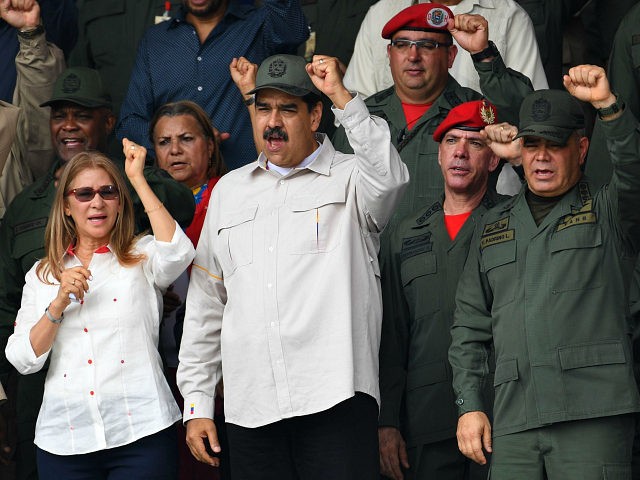Venezuelan dictator Nicolás Maduro celebrated the “rebel Christ” on Friday to mark Easter, what was once a joyous holiday in the country now nearly impossible to celebrate amid its current socialist collapse.
Holy Week promises to be a bleak time for most of Venezuela’s Christian population, most of whom are living in dire poverty and without access to basic living essentials. Most Venezuelans are unlikely to eat a full meal, while churches are often lacking the necessary bread and wine for the Eucharist.
As reported by El Nacional, at one Church in Tinaquillo, Cojedes state, desperate criminals stripped it of its bulbs and electrical lighting, meaning the service will have to take place in darkness.
In a typically brazen Twitter post of himself admiring a crucifix, socialist dictator Nicolás Maduro shared his own religious message at a time when the Venezuelan people are in great suffering.
“I greet all the people of good, who today renews their faith in our Lord Jesus Christ,” he wrote. “The rebel Christ who never bowed to the Roman Empire and who gave his life for our salvation, in his teachings we get the strength to continue building a prosperous Venezuela. Amen!”
Saludo a todo el pueblo de bien, que hoy renueva su fe en nuestro Señor Jesucristo. El Cristo rebelde que jamás se doblegó al imperio romano y que dio su vida por nuestra salvación, en sus enseñanzas conseguimos la fuerza para seguir construyendo la Venezuela próspera. ¡Amén! pic.twitter.com/XnmEm7siAB
— Nicolás Maduro (@NicolasMaduro) April 19, 2019
Despite being a self-confessed Marxist, the 55-year-old strongman has never made any secret of his Christian beliefs, asserting that Christ was himself a socialist. The United Socialist Party of Venezuela (PSUV) identifies as a pro-Catholic party, although late dictator Hugo Chávez is often portrayed as a deity. According to State Department figures, an estimated 99 percent of Venezuelans identify as Christians, with around 70 percent belonging to the Catholic Church.
At the end of Thursday’s mass in the Cathedral of Caracas, the Archbishop of Mérida, Cardinal Baltazar Porras, reiterated the importance of allowing U.S.-provided humanitarian aid into the country, which the Maduro regime has repeatedly blocked on the grounds of wanting to appear self-sufficient.
“The important thing is not who gives it, but who receives it,” the cardinal said. “That everything that is around humanitarian aid is really to fulfill its purpose. It is not a gift from anyone, but it is the need of our people.”
Venezuela’s Catholic Church has repeatedly clashed with the Maduro regime in recent years, criticizing it over its egregious human rights abuses and responsibility for the current crisis. In retaliation, regime-backed gangs have repeatedly targeted churches and property they believe are undermining Maduro and his far-left “Bolivarian Revolution.”
The Vatican is one of the few remaining Western states that has declined to officially recognize Juan Guaidó as the Venezuelan president. In January, the Pope sent a delegate to Maduro’s inauguration ceremony, lending the event legitimacy most of the free world agrees it did not merit. The Pope has personally refused to take sides in the crisis, instead offering to mediate talks between the regime and the opposition as well as pleading with the Maduro regime to release all of its political prisoners.
Follow Ben Kew on Facebook, Twitter at @ben_kew, or email him at bkew@breitbart.com.

COMMENTS
Please let us know if you're having issues with commenting.